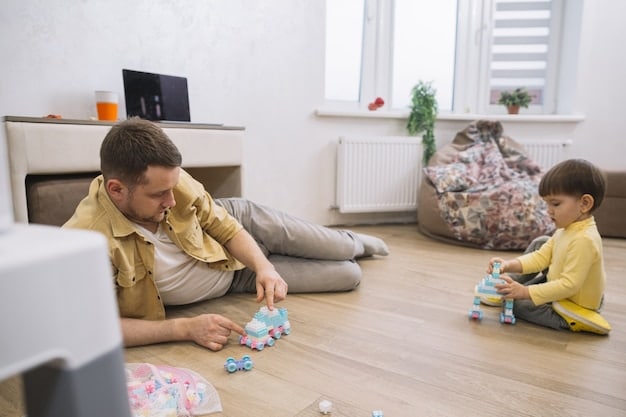The Impact of Divorce on Children: A Single Father’s Guide to Coping and Thriving

The impact of divorce on children can be significant, but single fathers can play a crucial role in helping their kids cope and thrive by providing stability, open communication, and consistent support.
Navigating divorce is tough, especially when children are involved. As a single father, you’re likely worried about the impact of divorce on children. This guide offers practical advice to help your kids cope and thrive during and after this challenging time.
Understanding the Emotional Impact of Divorce on Children
Divorce is a significant life event that can trigger a range of emotions in children. Understanding these potential impacts is crucial for single fathers to provide the necessary support and guidance.
Common Emotional Reactions
Children may experience a variety of emotions depending on their age, personality, and the circumstances of the divorce. It’s important to recognize these reactions as normal responses to a stressful situation.
- Sadness and Grief: Children may mourn the loss of the family unit and the life they once knew.
- Anger and Resentment: They might direct anger towards one or both parents, feeling abandoned or betrayed.
- Anxiety and Fear: Uncertainty about the future, living arrangements, and financial stability can cause anxiety.
- Guilt and Self-Blame: Younger children especially may believe they are responsible for the divorce.
It’s vital to reassure children that the divorce is not their fault and that both parents still love them. Providing a safe space for them to express their feelings is equally important.

Age-Specific Reactions
The way children react to divorce varies depending on their age.
Preschoolers may exhibit regressive behaviors such as bedwetting or thumb-sucking. Elementary school children might struggle with loyalty conflicts, feeling torn between their parents. Teenagers may become withdrawn or engage in risky behaviors.
- Preschoolers (3-5 years): May not fully understand divorce but can sense the tension and sadness.
- Elementary School Children (6-12 years): More aware of the changes and may worry about logistical issues.
- Teenagers (13-18 years): Can understand the reasons for the divorce but may still struggle with the emotional consequences.
By understanding these age-specific reactions, single fathers can tailor their support to meet their children’s individual needs.
Ultimately, acknowledging and validating children’s feelings is the first step in helping them navigate the emotional challenges of divorce. Creating an open and supportive environment allows them to process their emotions in a healthy way.
Creating a Stable and Supportive Home Environment
Stability is paramount for children experiencing divorce. As a single father, establishing a consistent and predictable home environment can help mitigate the negative impact of divorce on children.
Establishing Routines and Consistency
Consistent routines provide a sense of normalcy and security for children during a time of upheaval. Maintaining regular mealtimes, bedtimes, and homework schedules can help minimize stress and anxiety
- Regular Meal Times: Eating together as a family, even if it’s just you and your children, creates a sense of connection.
- Consistent Bedtimes: Adequate sleep is crucial for children’s emotional and physical well-being.
- Homework Schedules: Setting aside a specific time for homework each day promotes academic success.
Consistency also extends to parenting rules and expectations. Maintaining clear and consistent boundaries helps children feel secure and understand what is expected of them.
The Importance of a Supportive Atmosphere
Creating a supportive atmosphere involves fostering open communication, showing empathy, and providing unconditional love. Children need to feel that they can express their feelings without judgment.
Listen actively when your children talk about their emotions. Validate their feelings by acknowledging their pain and sadness. Avoid minimizing their experiences or telling them to “get over it.”
- Active Listening: Pay attention to what your children are saying, both verbally and nonverbally.
- Empathy: Try to understand their perspective and feelings.
- Unconditional Love: Remind them that your love is not contingent on their behavior or the divorce.
A supportive home environment is one where children feel safe, loved, and understood. This is especially important during the tumultuous time of divorce.
By creating routines, maintaining consistent parenting, and fostering a supportive atmosphere, single fathers can provide the stability their children need to navigate the challenges of divorce. This stable environment helps children feel secure and loved, reducing the negative impacts of the divorce.
Effective Communication Strategies with Your Children
Open and honest communication is vital for helping children cope with divorce. As a single father, developing effective communication strategies can foster trust, reduce anxiety, and strengthen your relationship with your kids.
Initiating Open Conversations
Creating a safe space for open conversations is crucial. Let your children know that they can talk to you about anything, without fear of judgment or reprisal. Regularly check in with them and ask how they are feeling.
Start conversations by asking open-ended questions such as, “How was your day?” or “What’s on your mind?” Avoid leading questions that might steer them towards a particular answer.

- Choose the Right Time: Avoid having serious conversations when you or your children are tired or stressed.
- Be Patient: Children may not always be ready to talk, and it’s important to respect their pace.
- Stay Calm: Even if the conversation becomes difficult, try to remain calm and avoid raising your voice.
Active Listening and Validation
Active listening involves paying attention to what your children are saying, both verbally and nonverbally, and responding in a way that shows you understand their feelings.
Make eye contact, nod your head, and use verbal cues such as “I understand” or “That sounds tough” to show that you are engaged. Validate their feelings by acknowledging their emotions without minimizing them.
- Paraphrase: Repeat back what you heard in your own words to ensure you understand correctly.
- Reflect Feelings: Identify and name the emotions your children are expressing.
- Avoid Judgment: Refrain from criticizing or dismissing their feelings.
When you actively listen and validate your children’s feelings, you create a stronger bond and demonstrate that their emotions are important.
By initiating open conversations, practicing active listening, and validating their feelings, single fathers can create a strong and supportive communication channel that helps children navigate the challenges of divorce. Through these strategies, children feel heard, understood, and loved, which is essential for their emotional well-being.
Co-Parenting Strategies for Single Fathers
Even after divorce, it’s important to establish effective co-parenting strategies to minimize the impact of divorce on children. Remember that your children need both parents in their lives, even if the relationship between you and your ex-spouse has ended.
Establishing Clear Boundaries and Communication
Clear boundaries are essential for effective co-parenting. This includes setting expectations for communication, decision-making, and parenting styles. Strive to maintain a respectful and business-like relationship with your ex-spouse when it comes to parenting matters.
Use a co-parenting communication app or a shared calendar to coordinate schedules, appointments, and school events. Avoid using the children as messengers or intermediaries.
- Set Communication Guidelines: Establish preferred methods of communication and response times.
- Define Decision-Making Processes: Determine how major decisions regarding education, healthcare, and religion will be made.
- Respect Each Other’s Parenting Styles: Acknowledge that you may have different approaches to parenting and try to find common ground.
Focusing on the Child’s Best Interests
Always prioritize the child’s well-being in all co-parenting decisions. Avoid involving the children in conflicts or speaking negatively about the other parent in front of them. Children need to feel free to love both parents without guilt or pressure.
Support your children’s relationship with their other parent by encouraging visits, phone calls, and participation in shared activities. Be flexible and accommodating when scheduling changes are necessary.
- Avoid Conflict in Front of the Children: Resolve disagreements privately and respectfully.
- Support the Child’s Relationship with the Other Parent: Encourage and facilitate their connection.
- Focus on Shared Goals: Remember that you are both working towards the same goal: raising happy, healthy children.
By establishing clear boundaries, prioritizing the child’s best interests, and fostering a cooperative relationship with your ex-spouse, single fathers can create a positive co-parenting environment that benefits their children.
Co-parenting requires effort, compromise, and a steadfast commitment to the well-being of your children. By focusing on their needs and working collaboratively with your ex-spouse, you can minimize the negative effects of divorce and provide a stable and supportive environment for your kids.
Self-Care for Single Fathers: Taking Care of Yourself
Being a single father can be incredibly demanding, especially after a divorce. Neglecting your own well-being can negatively impact of divorce on children. Therefore, prioritizing self-care is essential for your physical and emotional health, enabling you to be a better parent.
Prioritizing Physical Health
Taking care of your physical health involves getting enough sleep, eating a balanced diet, and engaging in regular exercise. These habits can boost your energy levels, reduce stress, and improve your overall mood.
Aim for at least 7-8 hours of sleep per night. Establish a regular sleep schedule and create a relaxing bedtime routine. Prepare nutritious meals and snacks to fuel your body throughout the day.
- Get Adequate Sleep: Prioritize sleep to improve your mood and energy levels.
- Eat a Healthy Diet: Consume balanced meals and snacks to nourish your body.
- Exercise Regularly: Engage in physical activity to reduce stress and boost your mood.
Nurturing Emotional and Mental Well-being
Divorce can take a toll on your emotional and mental health. It’s important to acknowledge your feelings and seek support when needed. Engage in activities that bring you joy and help you relax.
Connect with friends and family members who offer support and encouragement. Consider joining a support group for single parents. Practice mindfulness or meditation to reduce stress and improve focus.
- Seek Support: Connect with friends, family, or a therapist to process your emotions.
- Engage in Hobbies: Make time for activities you enjoy to boost your mood.
- Practice Mindfulness: Use relaxation techniques to reduce stress and improve mental clarity.
By prioritizing your physical and emotional well-being, you’ll have more energy, patience, and resilience to handle the challenges of single fatherhood. Remember that taking care of yourself is not selfish; it’s a necessary investment in your ability to care for your children.
Self-care is not a luxury; it’s a necessity for single fathers navigating the complexities of divorce and raising children. By prioritizing your physical and emotional health, you’ll be better equipped to provide the stability and support your children need to thrive.
Seeking Professional Help When Needed
Divorce can present significant challenges for both parents and children. Recognizing when to seek professional help is a crucial step in mitigating the impact of divorce on children and ensuring their well-being. Therapists, counselors, and support groups can provide valuable guidance and support during this difficult time.
Identifying Signs That Your Child Needs Support
Children may exhibit various signs that indicate they are struggling with the divorce. It’s important to be observant and proactive in addressing these concerns.
Look for changes in behavior, such as increased irritability, withdrawal from activities, decline in academic performance, or sleep disturbances. Pay attention to their emotional expressions, such as frequent crying, anxiety, or expressions of sadness and hopelessness.
- Changes in Behavior: Increased irritability, withdrawal, or aggression.
- Decline in Academic Performance: Difficulty concentrating or completing assignments.
- Emotional Distress: Frequent crying, anxiety, or expressions of sadness.
Types of Professional Support Available
Several types of professional support are available to help children cope with divorce. Therapists and counselors can provide individual or family therapy to address emotional and behavioral issues. Support groups offer a safe space for children to connect with others who are going through similar experiences.
Child psychologists specialize in understanding and treating the emotional and developmental needs of children. Divorce coaches can provide guidance and support to parents navigating the co-parenting process.
- Therapists and Counselors: Provide individual or family therapy.
- Support Groups: Offer a safe space for children to connect with peers.
- Child Psychologists: Specialize in the emotional and developmental needs of children.
Seeking professional help is a sign of strength, not weakness. It demonstrates your commitment to your children’s well-being and your willingness to provide them with the resources they need to thrive.
Recognizing when your children need extra support and seeking professional help can make a significant difference in their ability to adjust to the divorce. By being proactive and providing access to appropriate resources, you can help your children navigate this challenging transition and emerge stronger and more resilient.
| Key Point | Brief Description |
|---|---|
| ❤️ Stability | Consistent routines and a supportive home environment help children feel secure during divorce. |
| 🗣️ Communication | Open and honest conversations foster trust and reduce anxiety in children. |
| 🤝 Co-Parenting | Effective co-parenting strategies minimize the negative impact of divorce on children. |
| 💪 Self-Care | Prioritizing self-care enables single fathers to be better parents and cope with challenges. |
Frequently Asked Questions (FAQ)
▼
Maintain consistent routines and rules in both homes. Communicate regularly with your co-parent to ensure a unified approach. Provide a sense of stability and security by creating a comfortable and familiar space for your child in your home.
▼
Allow your child to express their anger without judgment. Validate their feelings by acknowledging their pain and frustration. Help them find healthy ways to cope with their anger, such as exercise, creative activities, or talking to a therapist.
▼
Focus on the child’s best interests and set boundaries to protect them from conflict. Communicate in a business-like manner, avoiding personal attacks or emotional arguments. Consider using a co-parenting app to streamline communication and scheduling.
▼
Look for changes in behavior, such as increased irritability, withdrawal, or aggression. Monitor academic performance for any decline. Pay attention to emotional expressions, like frequent crying, anxiety, or statements of hopelessness. If these signs persist, seek professional help.
▼
Prioritize your physical and emotional well-being. Get enough sleep, eat a balanced diet, and exercise regularly. Connect with friends, family, or a therapist for support. Engage in activities that bring you joy and help you relax. Remember, self-care is not selfish—it’s essential.
Conclusion
Divorce is undoubtedly a challenging experience for everyone involved, but especially for children. By understanding the emotional impact of divorce on children, creating a stable home environment, communicating effectively, implementing co-parenting strategies, prioritizing self-care, and seeking professional help when needed, single fathers can help their kids cope and thrive during this difficult transition, building a stronger, more resilient family unit.





